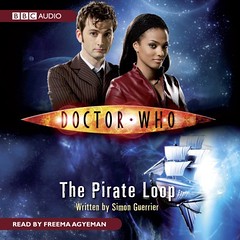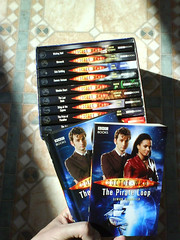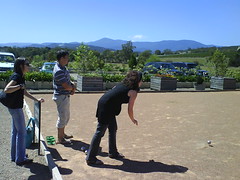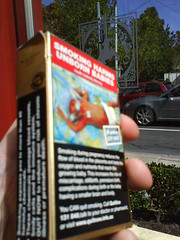To the NFT last night for the annual
Missing Believed Wiped – an evening of odd bits of old telly that have found their way back to the archive. I missed the 2008 event due to commitments, but
blogged the one before.
As I said then, it's always an odd collection – and the appeal lies in just than incongruity. Things you'd never see together, and things you'd never seek out, make for a tantalising window to the past.
First was a short film on the
Bob Monkhouse Collection – as
Jonny says, in large part it seemed a collection of Monkhouse's own appearances. The some 50,000 film cans and videos are of limited appeal to the NFT because much of the programmes already exist in some form.
Kaleidoscope have stepped in to manage the collection, which is fascinating as an insight into Monkhouse himself. He used the tapes as research for jokes and people he might work with, but also the mentality behind the collection says a lot in itself. The history of the collection – Monkhouse was taken to court for giving a copy of Goldfinger to Terry Wogan – also reveals a lot about archives in themselves.
This was followed by a collection of comedic bits from the early days of satellite station BSB. As Ian Greaves explained, junking of archives was still going on as late as the 1990s. The material shown in itself wasn't particularly brilliant, but showed early material from Keith Allen and Armando Ianucci – the latter probably the best of the lot.
I thought a lot more of
His Lordship Entertains than Jonny did – and more readily saw the debt owed it by Fawlty Towers. The jokes came thick and fast, and there were also all
kinds of jokes: word-play, slapstick, farce and character stuff. I loved the two old ladies telling filthy stories (a vacuum cleaner stops us hearing the most saucy bits), and was impressed by how many aged actors were involved. I think it was pushing beyond Up Pompeii, but I'm not sure what it was pushing towards.
Till Death Do Us Part was pretty ropey, with – as Jonny says – the best bits all Dandy Nichols as Else, who tellingly took no part in the topical bits. It was a surprisingly cheap show – all set in Alf's living room but for two brief scenes in front of blown-up photos, and with lines only for the regular cast of four. It was an uncomfortable episode too, not because of the words “coon” and “wog” so much as how much of the programme was given over to Alf's ranting. The cool kids might roll their eyes at his prejudice, but there was little in the way of counter-argument, and the last joke depends on Alf being clumsy rather than being wrong. The viewing notes expressed surprise that “some viewers actually agreed with Alf”, but the episode is all about him having his say.
Both these episodes seemed to be about the loss of the old Empire – Ronnie Barker's Lord Rustless having to open up his stately home as a hotel rather than flog it to the National Trust, Alf horrified by Britain losing it's place as a first-rate nation. But there were also lots of odd little details I loved: Rita (Una Stubbs) laquering her handbag, or having to boil a kettle to do the washing up. And Else, who lives in Wapping, has apparently never before been to Downing Street or Buckingham Palace.
(The ever-wise T. also pointed out that
Mr Quill himself, Bill Burridge, is one of the non-speaking crowd at Downing Street. Frank Gatliff – Badger, butler to Barker – was obviously Ortron in
The Monster of Peladon.)
Jonny didn't sit through part two of the event, which was all music from the 60s and 70s. The only extant episode of
Time for Blackburn from 1968 had a very quick-edited performance by The Who of “The Magic Bus”, that made the women sat next to me dizzy. There was an odd interview with Jonathan King at a record industry do, and a plug for a “psychedelic pantomime”. But mostly it seemed a sub-Top of the Pops, with Blackburn barely bumbling along through the links, at one point explaining that he was always up himself.
We next had a selection of clips from
Look! Hear!, a regional youth programme from the 1970s. The Dr almost exploded when a young, jumper-wearing
“Mike” Wood introduced Black Sabbath, years before he followed in the footsteps of Alexander (mostly with his top off). There was also a glorious live performance by
The Selecter, when the kids in the audience took over the stage. Somehow, a camera was ready up in the lights to look down on the action.
There were then two episodes of Top of the Pops. The first, from 1976, reminded us how old the presenters used to be, and how hokey the sets. Pans People managed to be sexist and yet not quite sexy, and we cheered at a bit of E.L.O. But mostly the music was pretty execrable – as
Dick Fiddy said in between episodes, that's why we needed punk. I thought the Dr might tear her ears off during a performance by R and J Stone of “We Do It”. But the episode also ended with the Bohemian Rhapsody video. How odd to see something so familiar in context, and see just why it blew all competition from the water.
I'd forgotten how awkward the audiences always were in these things, nervously watching the cameras for their cues. But it also surprised me how multi-racial the music programmes were compared to so much other telly of the time – something I've been researching recently for a work thing.
The second episode was from 1967, in ropey black-and-white that kept coming to pieces.
Fluff Freeman introduced “See Emily Play”, Pink Floyd fronted by Syd Barrett (who I thought looked a lot like
Benjamin Cook). The picture flickered and snowed, the sound dropping out and then dropping back in. I'd love to see a reconstructed version, but this warped and warping effort took me right back to all those nth generation videos of old Doctor Who that made up a lot of my teenage life.
There was then a bit more warped footage from later in the episode – Ray Davies (introduced as “Dave” by Fluff), and Procul Harem's “Whiter Shade of Pale” with a lead singer dressed for no reason at all as a stereotypical Chinaman. It was sometimes a job to tell what were original video effects and what was the tape going weird, and Fluff seemed to commentate from another glacial age. How strange for a programme – and a time – to be so cool and so square all at once.
After, there was just time for a beer and to say hello to the many, many like-minded chums, but we ducked out of festivities in favour of just getting home while there were still some trains.





















